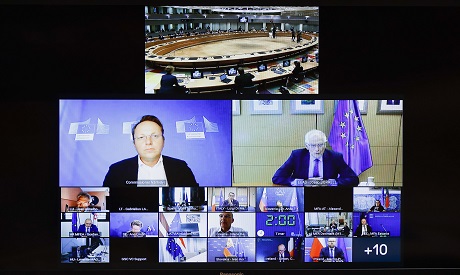
European Union foreign policy chief Josep Borrell, screen middle right, speaks with EU foreign ministers and representatives as he takes part in an extraordinary Foreign Affairs Council, via video link, at the European Council building in Brussels, Tuesday, Aug. 17, 2021 AP
The European Union's foreign policy chief Josep Borrell said on Tuesday the bloc will have to talk to the Taliban after the group seized control of Afghanistan.
"The Taliban have won the war, so we will have to talk with them," he said, while stressing this does not mean moving quickly to officially recognise their rule.
Borrell was speaking after an urgent meeting of EU foreign ministers, called after the rebels overthrew the Afghan government.
The Taliban, who were driven from power two decades ago by a US-led coalition only to make a stunning comeback, have promised to pardon Afghans they consider foes for having worked with the West.
But the EU, many of whose members are also NATO allies which fought the group, are concerned about the fate of their citizens in Afghanistan as well as local Afghan employees.
They are also worried that the Taliban's brutal reputation and imposition of Islamist rule could hurt women's rights and trigger a new wave of migration towards Europe.
Borrell said Brussels would "engage in a dialogue as soon as necessary to prevent a humanitarian and a potential migratory disaster".
"This dialogue will also have to focus on the means to prevent the return of a foreign terrorist presence in Afghanistan," he added.
The Taliban are allies of the al-Qaeda global network and, despite their promises, Western capitals fear Afghanistan could again become a haven for extremists bent on attacking them.
Borrell said that, for these reasons, Europe would need to talk to Kabul's new masters.
"It is not a matter of official recognition, it is a matter of dealing with them," he said.
"If I want 400 people, Afghans and their families, that have been working for us today in the European Union delegations, to reach the airport, you can understand that I will need to talk with the Taliban authorities.
"If not, it's going to be quite difficult for them to reach the airport... It's going to be a quite complicated logistical operation.
"So we have to engage with them. And at the same time, remain very vigilant on the respect of their international obligations," he said.
Suspending Payments
The European Union is suspending payments of development assistance to Afghanistan now that it has fallen to the Taliban but is weighing whether to boost humanitarian aid to the conflict-ravaged country.
Borrell says there can be ``no payments of development assistance until we clarify the situation'' with Taliban leaders.
Borrell said the Taliban must respect U.N. Security Council resolutions and human rights to earn access to the funds.
Borrell says that ``humanitarian help will continue, and maybe we will have an increase,'' given the number of displaced Afghans, the ongoing drought, and the impact of the coronavirus pandemic.
The 27-nation bloc has pledged about 1.2 billion euros ($1.4 billion) in development assistance for Afghanistan for the period 2021-2024.
Short link: